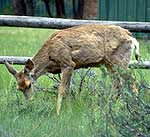By Erin Galbally
Minnesota Public Radio
July 16, 2002
A second special deer hunt is underway this week in southwestern Wisconsin. It's part of an attempt by state wildlife officials to eradicate chronic wasting disease. Ultimately, they hope to eliminate the regions entire deer population. The real kill is expected this fall, when hunters from across Wisconsin will likely bag as many 50,000 animals. A good percentage of those deer will be tested for the fatal brain wasting illness. But at the moment, only six laboratories in the country are federally certified to perform the test.
| |
|
|
|
||
Brain samples from deer killed during this week's hunt in Wisconsin are being sent to the nearest federal labratory in Ames, Iowa for testing. The testing takes months. In fact, it's expected to be spring before state officials know if chronic wasting disease has spread from Madison to Milwaukee. Part of the reason is time needed for the test itself. On top of that, however, the handful of the federal labs certified to do the work are flooded with samples.
So Butch Johnson and a couple of friends decided to open a private laboratory in Hayward in north central Wisconsin. Johnson says they hope to provide speedy testing.
"The turn around time is we can do it in three days that would be the turn around in the lab that we proposed," explains Johnson.
He says his lab would serve hunters who want to find out whether their meat is infected.
However, Johnson's laboratory may never make it beyond the drawing board.
That's because the U.S. Department of Agriculture is refusing to certify private labs. The USDA is the lead agency in charge of chronic wasting disease. It controls the rights to the testing process. Johnson says the decision to exclude private laboratories is irresponsible.
"The hunter can't sit and wait for six months to a year to find out what the result is, nor should the state not have the data available," says Johnson. "The best time to collect that material is during the hunting season."
Johnson says hunters contribute roughly $2 billion to Wisconsin's economy each year. Fewer hunters are expected to come out this year because of chronic wasting disease.
The USDA doesn't see the issue quite the same way. Ed Curlett works in the agency's division of Plant and Wildlife Inspection. Curlett says allowing private tests to individual deer for the disease misses the point. He says this is a test meant for entire populations.
"It's a test we can use to determine where it exists. But if you want to know individually if the animal a hunter kills is has chronic wasting disease this test isn't designed to that," says Curlett. "It's not a food safety test."
The test is not always accurate. It has a 30 percent false negative rate. As a result Curlett says hunters may wrongly believe their venison is free of chronic wasting disease.
"Hunters are going to have to make the decision depending on where they hunt and the conditions of where they kill, whether they want to consume that animal," explains Curlett. "There's no evidence that chronic wasting disease is transmissible to human but there's no evidence to the reverse either. There's not a whole lot known about this disease."
The USDA is making no recommendation as to whether hunters should eat venison, even in the area around Madison where infected animals have been found.
Bob Manwell works for the Wisconsin DNR. Manwell says his department will focus this fall on mapping the disease.
"While we won't be able to on demand testing for every hunter in the field we will be able to tell with a high degree of statistical accuracy whether the disease is present in a given county," says Manwell.
The USDA is opening an additional lab in Wisconsin in time for the fall hunt. Information about the spread of the disease probably won't be available until after hunting season.
Meanwhile federal scientists are investigating whether chronic wasting disease can be passed onto humans who eat infected venison. Wisconsin's senate and congressional delegation is lobbying the USDA to change its position on private laboratories and Butch Johnson says he'll go ahead and open his lab for businesses this fall regardless of federal approval.
More from MPR
